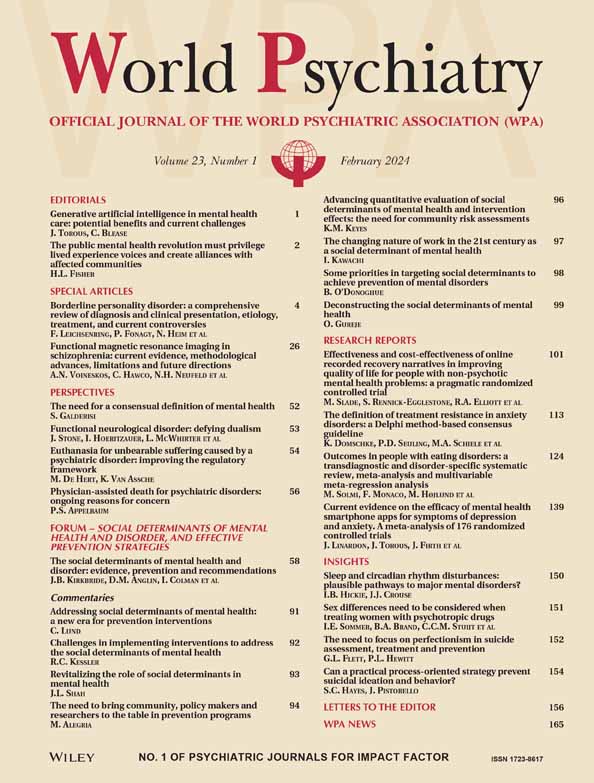失眠的评估和管理:最新进展
IF 60.5
1区 医学
Q1 PSYCHIATRY
引用次数: 90
摘要
失眠对公众健康构成重大挑战。这是一种常见的疾病,与功能和生活质量的显著损害、精神和身体疾病以及事故有关。因此,在临床实践中提供有效的治疗是很重要的。为此,本文回顾了评估失眠的关键方面和可用的治疗方案。这些选择包括非药物治疗,最明显的是失眠的认知行为治疗,以及各种药物治疗,如苯二氮卓类药物、“z -药物”、褪黑激素受体激动剂、选择性组胺H1拮抗剂、食欲素拮抗剂、抗抑郁药、抗精神病药、抗惊厥药和非选择性抗组胺药。对现有研究的回顾表明,一些最常用的失眠症治疗缺乏严格的双盲、随机、对照试验。然而,在具有上述特征的试验中,有一系列干预措施已被证明对失眠有治疗作用,其风险/收益概况已被很好地描述。这些干预措施可以在临床实践中形成系统的、基于证据的失眠治疗的基础。我们回顾了这一证据基础,并强调了需要进行更多研究的领域,目的是为改善许多失眠患者的临床管理提供资源。本文章由计算机程序翻译,如有差异,请以英文原文为准。
The assessment and management of insomnia: an update
Insomnia poses significant challenges to public health. It is a common condition associated with marked impairment in function and quality of life, psychiatric and physical morbidity, and accidents. As such, it is important that effective treatment is provided in clinical practice. To this end, this paper reviews critical aspects of the assessment of insomnia and the available treatment options. These options include both non‐medication treatments, most notably cognitive behavioral therapy for insomnia, and a variety of pharmacologic therapies such as benzodiazepines, “z‐drugs”, melatonin receptor agonists, selective histamine H1 antagonists, orexin antagonists, antidepressants, antipsychotics, anticonvulsants, and non‐selective antihistamines. A review of the available research indicates that rigorous double‐blind, randomized, controlled trials are lacking for some of the most commonly administered insomnia therapies. However, there are an array of interventions which have been demonstrated to have therapeutic effects in insomnia in trials with the above features, and whose risk/benefit profiles have been well characterized. These interventions can form the basis for systematic, evidence‐based treatment of insomnia in clinical practice. We review this evidence base and highlight areas where more studies are needed, with the aim of providing a resource for improving the clinical management of the many patients with insomnia.
求助全文
通过发布文献求助,成功后即可免费获取论文全文。
去求助
来源期刊

World Psychiatry
医学-精神病学
自引率
7.40%
发文量
124
期刊介绍:
World Psychiatry is the official journal of the World Psychiatric Association. It is published in three issues per year.
The journal is sent free of charge to psychiatrists whose names and addresses are provided by WPA member societies and sections.
World Psychiatry is also freely accessible on Wiley Online Library and PubMed Central.
The main aim of World Psychiatry is to disseminate information on significant clinical, service, and research developments in the mental health field.
The journal aims to use a language that can be understood by the majority of mental health professionals worldwide.
 求助内容:
求助内容: 应助结果提醒方式:
应助结果提醒方式:


